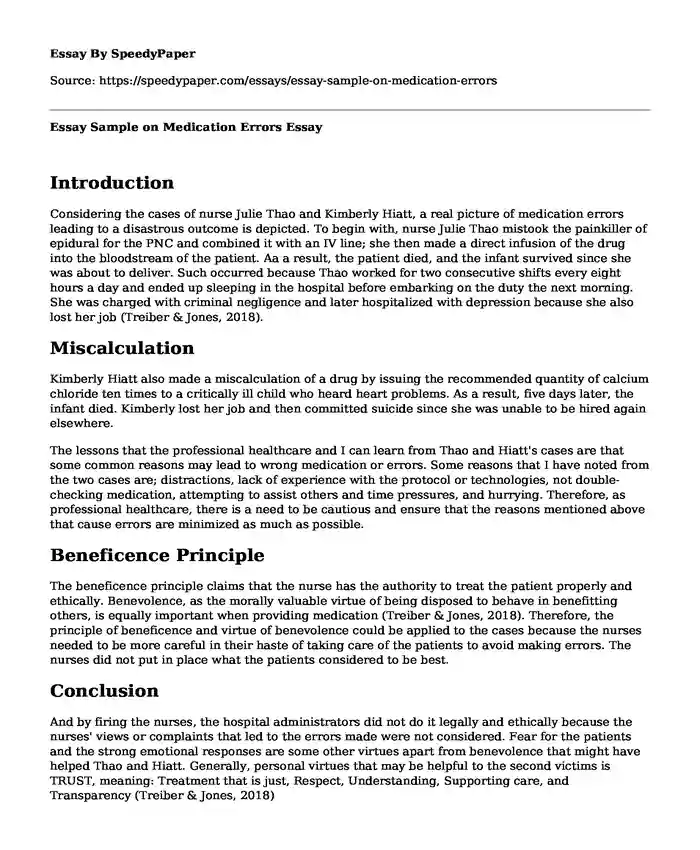Introduction
Considering the cases of nurse Julie Thao and Kimberly Hiatt, a real picture of medication errors leading to a disastrous outcome is depicted. To begin with, nurse Julie Thao mistook the painkiller of epidural for the PNC and combined it with an IV line; she then made a direct infusion of the drug into the bloodstream of the patient. Aa a result, the patient died, and the infant survived since she was about to deliver. Such occurred because Thao worked for two consecutive shifts every eight hours a day and ended up sleeping in the hospital before embarking on the duty the next morning. She was charged with criminal negligence and later hospitalized with depression because she also lost her job (Treiber & Jones, 2018).
Miscalculation
Kimberly Hiatt also made a miscalculation of a drug by issuing the recommended quantity of calcium chloride ten times to a critically ill child who heard heart problems. As a result, five days later, the infant died. Kimberly lost her job and then committed suicide since she was unable to be hired again elsewhere.
The lessons that the professional healthcare and I can learn from Thao and Hiatt's cases are that some common reasons may lead to wrong medication or errors. Some reasons that I have noted from the two cases are; distractions, lack of experience with the protocol or technologies, not double-checking medication, attempting to assist others and time pressures, and hurrying. Therefore, as professional healthcare, there is a need to be cautious and ensure that the reasons mentioned above that cause errors are minimized as much as possible.
Beneficence Principle
The beneficence principle claims that the nurse has the authority to treat the patient properly and ethically. Benevolence, as the morally valuable virtue of being disposed to behave in benefitting others, is equally important when providing medication (Treiber & Jones, 2018). Therefore, the principle of beneficence and virtue of benevolence could be applied to the cases because the nurses needed to be more careful in their haste of taking care of the patients to avoid making errors. The nurses did not put in place what the patients considered to be best.
Conclusion
And by firing the nurses, the hospital administrators did not do it legally and ethically because the nurses' views or complaints that led to the errors made were not considered. Fear for the patients and the strong emotional responses are some other virtues apart from benevolence that might have helped Thao and Hiatt. Generally, personal virtues that may be helpful to the second victims is TRUST, meaning: Treatment that is just, Respect, Understanding, Supporting care, and Transparency (Treiber & Jones, 2018)
Reference
Treiber, L. A., & Jones, J. H. (2018). Making an infusion error. Journal of Infusion Nursing, 41(3), 156-163. https://europepmc.org/article/med/29659462
Cite this page
Essay Sample on Medication Errors. (2024, Jan 01). Retrieved from https://speedypaper.net/essays/essay-sample-on-medication-errors
Request Removal
If you are the original author of this essay and no longer wish to have it published on the SpeedyPaper website, please click below to request its removal:
- Current Issue in Substance Abuse Prevention. Essay Example.
- Free Essay with a Systematic Review on the Use of Some Drugs in Clinical Pharmacology
- Healthcare Essay Sample for Everyone
- Actual Outcomes/Evaluation
- Essay Example. African American Issues
- Critical Appraisal of Research Quality in Medical Field - Essay Sample
- Essay Example on Physician Assisted Suicide
Popular categories





